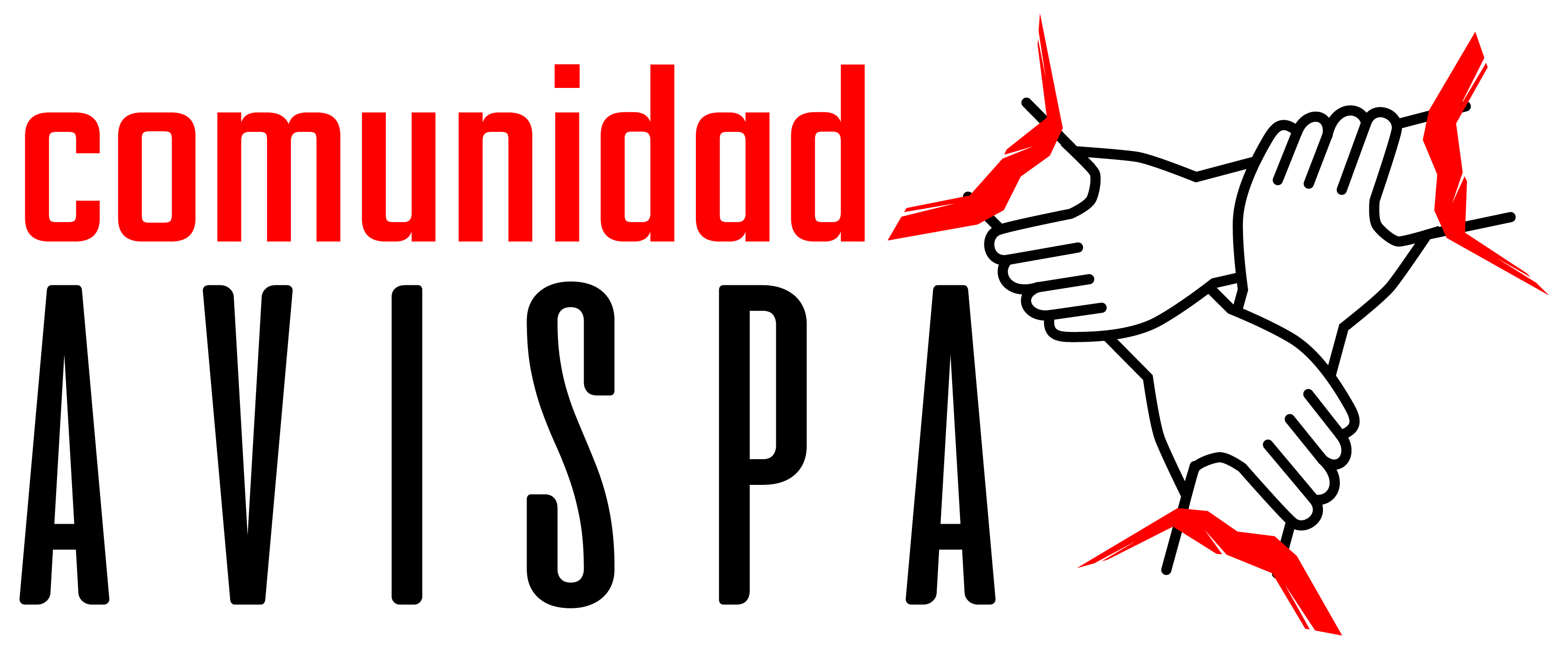Avispa Midia will be presenting a series of processes and exercises for the construction of autonomy. Other forms of social relations. The following is an interview with members of the Blacklidge Community Collective. They share the experience of their community space, which also serves as a dining room, print shop, library and many other self-organized activities in Tucson, Arizona.
Avispa Midia (AM): How would you describe the project?
Y: The short version is, it’s a space for experiments in autonomous living. But in that, it’s also a library, it’s also a garden, it’s also a community center, it’s also like a commons. It's all of those things. It’s a DIY venue…
X: Yeah, I think most often when I don’t feel like saying BCC or the “Blacklidge Community Collective,” I just refer to it as “the community space.”
Z: It’s a PHYSICAL space, and I think that’s really really important, that we have a physical space, together. If anybody has a desire to do or host something here, like it’s never been turned down. It’s just this expansive space where we can create things.
AM: How did the project start and how many people are involved?
Y: Depending on how detailed you wanna get, it started out of the remnants of a cooperative coffee shop called A Shot in the Dark. After it closed, some of the worker-owners there who were mostly very young, teenaged to early 20s punks, newly interested in anarchist politics, were very invested in starting a DIY venue that also did harm reduction work. And getting to know them, it was probably just 2 micro- generations of people coming out of anarchist circles and subcultures, and we kind of were talking to them, just like older folks 15 years older than them roughly, about also looking for a space.
So, we found a small space in the neighborhood just north of here in which we did basically just that. Where on top of doing DIY shows and a harm reduction drop-in center during the day, we would do other kinds of events at night - poetry readings, we did a tattoo fundraiser, lectures and workshops. And then just before the pandemic, we found this space. And it expanded, joining forces with multiple archival projects and the print shop project that were also looking for a space. And then shortly after that, Tucson Food Share joined us, and a mutual aid project joined us. And that’s sort of more the current iteration. We moved into this space only like a month to 2 months before the uprising.
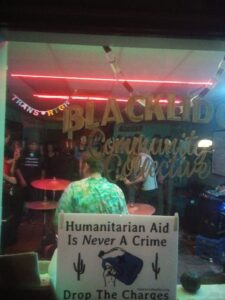
Anyone is welcome to the meetings. Yeah, I mean, I don’t know, as far as people who come here regularly, maybe roughly once a month come here - 100 people? Or maybe more - 120 people? People who come to meetings it’s maybe a core group of about 10-15 people. And people that are around on a more weekly basis because they’re a part of some project here, or are coming to a lot of things here, 40.
Z: And then last weekend there was a play, Romeo and Juliet, and there were probably 300 to 400 people here over the course of 3 days, maybe more? In the street, blockaded off for the play.
Maybe this is a good section to talk about - are there any other projects that happen here that we haven’t mentioned yet?
Y: The Mesh Network is an experiment in trying to get affordable to free, semi-autonomous internet access. And so, probably the biggest one in the United States that I’m aware of is in New York City and this project, the local Tucson -what are they calling it? -Internet Commons or something, is largely inspired by the project in New York.
And, yeah, you basically have these transmitters that get put on top of rooftops within a certain distance of each other, I think the range is roughly a mile, but it’s better if it’s closer. And yeah, those different nodes connect to each other and talk to each other and you can slowly spread internet access as you put more and more of those antennas up.
You need concrete access, like you need a doorway, a gateway into the main internet which is what most internet companies are providing you - they have space in a large server farm that all of their network is connected to. So, all those internet service providers, that’s what they do, and then they charge you for access to their gateway.
And so the Mesh Network is hoping to provide - it’s not fully autonomous internet because the internet isn’t fully autonomous- but their long term plan is to buy servers at a server farm nearby within range of our rooftop, and be able to provide free and semi-autonomous, less regulated internet access to anybody that’s in range of the antennas.
Z: Did we mention the garden? I think the garden is really special. They way that this building is set up, it’s a big brick warehouse at the end of a Dead End road. So you pull up and the garden is right in front of the main entrance to the building - you have to walk through the garden to get inside. The desert is really harsh and the summers are really hard here and things die really easily, and I feel like the garden is just this energy of life that you walk through to get into this space.
X: There’s a lot of different goals with the garden. We don’t think that we’re going to really change the course of food sovereignty with this tiny little garden, but we can try. We can at least make some difference in how much money we’re individually spending on groceries. We can at least have food to contribute to the weekly dinners that happen here. Just kind of like, planting a seed in people’s minds of thinking about food sovereignty and the way we get our food and how fucked up food systems are.
Y: I’d maybe add something related to the garden - it’s maybe like a big picture thing as far as what’s interesting to me about the BCC. A friend said when reflecting on their grocery program that they had at a similar space in Atlanta, Georgia that the food program that they were doing at the time - it fed, you know, a couple hundred people a week probably. But the thing that was important to them wasn’t the quantity of people they were feeding, but the fact that everyone involved with the space, as well as people that were just coming to the space for the food program, were all reliant on food program, on some level at least, for food.
And so, in those moments, through that program, they were all tied together and they all needed each other. And that set the pace for building autonomous relationships and autonomous communities - it’s like, that’s the kind of interdependence we need. And for me, the garden really contributes to that, or at least holds the seeds for something like that.
Z: Food is so important - the connection between the garden, feeding ourselves, feeding each other, the Tucson food share, a project that was housed out of here before they moved into their own building, and of course the Tuesday night dinners, which we haven’t talked about too much yet. But the Tuesday night dinner is my favorite event that happens here.
There’s probably like 50 to 100 people who you can almost guarantee will be there on a rotating basis, like people that you know you’re going to see every week and I just think that’s really special.
The connection between growing plants, watering things, having food, getting food from the food share to cook dinner for ourselves, to feed other people, and then like - people bring their moms to TND and shit. It’s special.
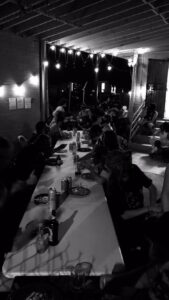
X: Yeah, something that I’m thinking about is this person whose work I really enjoy, Dayna Lybb Nuckolls, who defines liberation as, “the labor of communal imagining,” and I feel like that really goes down here a lot.
When I think about that phrase, the first thing I think about is Tuesday dinners. Because it’s not just having dinner together. It’s all these other things of coming together communally in the space to make dinner together, and having different people do different roles every week - coming together in that way. Going to the food share to get the food, and then coming here and making the food together, and then serving the food, and then people come and eat it and hang out together and talk in person, away from screens.
Z: Yeah, a lot of projects and things that I really care about in our community started at the BCC dinner and continue to flourish because of that commitment of like, I see you every week and if I have a question, I just ask you at dinner, and then we have a conversation about it.
Y: And what’s so cool about that is, the number of projects that have come and gone from the space only being here 2 years, is actually really cool, because it’s proving that this experimental hub idea, or approach that we’re having, is constantly generating new projects and new initiatives that can take on a life of their own.
Z: I’m thinking about how an idea needs a home in order to grow, and in order to start. And sometimes people want to do something, or people want to start something, but If you don’t have a place to do that, it’s harder. I mean it’s back to, the BCC is a physical space. It’s a building that we can walk into and do things together in, and especially in the desert, we need an indoor space. We are blessed by having the indoor space and the AC and everything.
AM: What are the main needs or problems you are addressing with this project?
X: The need for physical space. Like you said, ideas need a home to be able to grow.
When I moved to Tucson, I was just blown away like, oh my god people are really doing shit that we could never do in Phoenix, partially I think because there wasn’t a physical location. We were all just doing shit out of our bedrooms, which is still feasible and you can still do a lot of things that way, but definitely not to the same capacity. Especially when you’re just doing it by yourself or with a couple of friends, there’s not that opportunity to meet other like-minded people to then branch off and do other projects with.
Y: If we’re thinking in the broadest term, or the broadest base of people who may be a part of the space, we’re talking around 100-120 people. Those people don’t all think the same, they don’t all have the same goals. At the very least, they don’t all have the same words to describe those goals. Maybe there’s certain aligned values amongst all of those people, or inclinations maybe is a better word.
But for me, what is and always has been exciting about the potential of the BCC, is to build a real movement. And not in just this very constituent framing of building new subjects that will influence government or something. But like, new ways of relating and living together that will at least help be some of the seeds for a better way of living in the midst of all of this crisis and capitalism and global order.
I’d like to think we are the tiniest little specks of what could become something like Rojava or Chiapas and the Zapatistas. You know, they’re blowing us out of the water. I don’t want to put us on some sort of plane that’s anywhere close to the epicness of what they’re doing, and the challenges that they’re all really facing - people are dying constantly - there’s real stakes to what they’re doing. So, I don’t mean to compare us in that way.
But my hope is that there’s some seeds, of potentially decades in the future - that some of those people who are doing that in this area, can trace some things back on some level to the BCC.
For me, it’s not just creating a space to feel good and connect with cool people. Which, it’s obviously that, that’s a big aspect of it. But it’s to build material resources to survive and materially resist the state.
The BCC was supportive in concrete ways to the protests in the summer of 2020, and the uprising, both materially and vocally. We’ve been supportive of the protests growing against the deaths in the Pima County jail. We did a tattoo fundraiser for Chilean prisoners in the wake of their uprising in 2018. We’ve done info nights for Fidencio Aldama - who is a Yaqui political prisoner for resisting a pipeline in Sonora.
Z: I think a problem that this project addresses is isolation. I feel like capitalism pushes us to be so individualistic, and we fight that in this really simple way of gathering and coming together.
AM: Do you consider this project to be an alternative to capitalist relationships?
Y: I would say that’s the effort - to push those dynamics and those relationships increasingly to the fringes of our lives as much as possible. That framing for me is more useful than trying to live some pure life in which suddenly we are not subject to those things, but that in given moments and in the longer trajectory, we are pushing those things further and further out.
Z: I also think it’s really important to note how new the project of the BCC is. It’s so young and it’s so early.
So, like - are we an alternative to capitalist relationships? Yes.
Are we living in this whole other dimension where we don’t participate in capitalism at all? No.
But are we trying really hard to plant those seeds so that hopefully, eventually, we are participating as little as possible? I think we are. I think we’re planting it; we’re starting it.
X: Even just in the short time that I’ve been here, being here consistently has forced me to re-think and re-frame ways of relating to myself and to other people and to place, outside of what is ingrained in us by capitalism and by this way of life. I think it’s a mistake to think that spaces like this are automatically different and we’re in this bubble that isn’t touched by these things anymore.
AM: How do you make decisions and how do you confront obstacles?
Z: Something I love about this project is that whoever has the energy in the moment to do something, those are the people just doing that project. And very rarely do we try to filter or censor each other in the things that we have energy to do. It feels really open to a lot of people’s different methods and ideas and ways of making decisions.
Y: A part of it is that consensus, as some sort of decision-making process, in a project that is this multi-faceted…. There’re multiple different projects housed here that do vastly different things. Printing is not the same as fucking gardening. And so, in a consensus process - what does someone who is almost exclusively doing things in the print shop have to say about the garden?
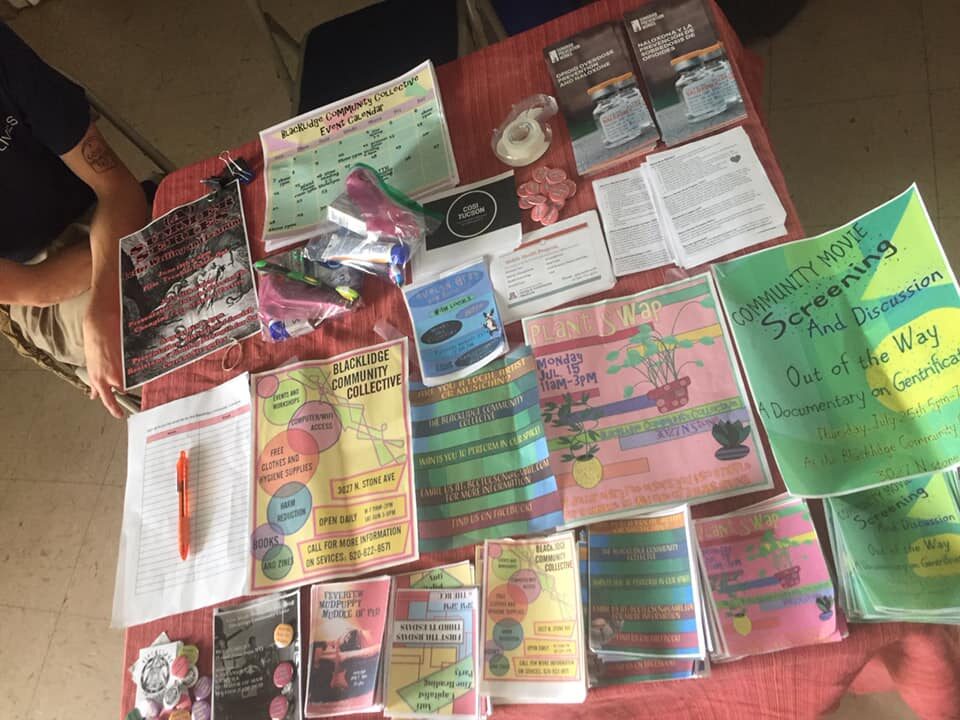
Z: And I think something that’s so cool about this space is like - how are those decisions made? It’s not the print shop and the garden sitting in a room for two hours having a meeting, and taking meeting notes, and sending out the notes document, and talking about it and then voting on it for two months - it’s simply, maybe 2 maybe 5 people, probably eating food, in person, making eye contact, having a conversation, and figuring it out.
Y: There’s a way that radicals in general get obsessed with “process” as the representation of the “new way” - but it’s still actually a strange governance mentality, where it’s like, “our experience of relating together is through a mediated process of negotiation” of like, “this is the governance space where we decide how we live together”
And that’s not actually how people live together. What matters more is our relationships to each other. Direct relationships, as un-mediated as possible.
AM: What has been the main thing you’ve learned so far?
[birds chirping]
X: I feel like I’m just learning shit all the time, every time I come here. Just generally, I’ve learned how to be a better human.
Z: I’ve learned this before in life, but the BCC has really solidified it for me that - navigating the world is so much easier with other people. Like, doing things alone is almost never the easiest way.
X: Something that I heard a while ago is that survival is a shared burden, and not an individual obligation. And the BCC has really concretely solidified that in my mind by showing it to me physically.
Z: A cheesy thing that I've learned is - hope. Hope for the future. There’s a really, really wide umbrella of people who spend time here and projects that happen here, but a really consistent thing that I see here is people who really believe in something beyond just right now and just today. And people who really care about it and think about it frequently, and in their everyday actions are trying and working to build that. Learning hope, learning friendship, trust, consistency, commitment.
Y: Yeah, who knows? It could all collapse tomorrow.
Z: Exactly! Good thing we are here right now, in the beautiful garden. It is such a nice day.
AM: Is there anything else you want to share about the project?
Z: Is there some kind of one liner to describe the BCC that we missed? It’s just so hard to pin down like, is it an anarchist project, is it an autonomous project?
X: It isn’t any one of those things, which I think is worth celebrating. Maybe to other people it may seem vague or distant, but I think that’s a really great thing. Like with anarchists in Phoenix, for example, sometimes there’s so much emphasis on defining [a project’s] limits and boundaries that they’re suffocating themselves before they even start.
And I think that’s something that the BCC does really well - not having those hard limits and not having those hard boundaries of what the BCC is and can be, that makes it able to be so fluid in a way that works really well. It opens up so much space for so many things to live and thrive.
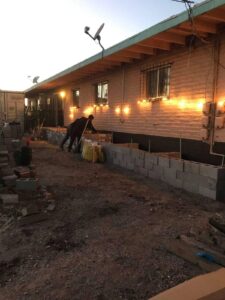
Y: I mean even just that language that you used…where people who are maybe not as close to the BCC could have a hard time “pinning it down,” is like, you know, the effort to pin down, there’s a lot of dominance implied in that phrasing. There’s an implication there. When we’re trying to pin down what something is, we should question why we’re trying to do that. What is the function of pinning something down?
Z: Yeah, it’s actually beautiful that we don’t try to. That’s unique for me - that we’re not forcing ourselves to define anything.
Y: When writing the mission statement or whatever that hasn’t been approved yet, I kind of opened with the line that we are living at the end of America. And hopefully the BCC will outlast America. Whether in this form or some other form, I think we will outlast America.
Z: I think that too. I really liked what you said, Y, about how maybe 20 years from now, something in that time can be traced back to something that was started here, right now.
Y: Some would argue that America is already over and we are merely living in her death rattle.
[laughter]
[birds chirping]


